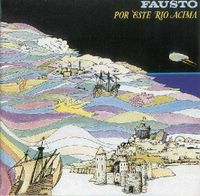 Do melhor que há na Musica Popular Portuguesa de Qualidade.
Do melhor que há na Musica Popular Portuguesa de Qualidade."Very few artists can express a feeling as vague and ambiguous as national identity. Writers have done it many times throughout the history of literature but only the likes of Wagner or Grieg have managed to fill their music with a certain patriotic touch. In fact, I can't think of any Portuguese artist in our folk-music spectrum that manages to capture the epic tones of some of our literary works (“Os Lusíadas”, for example), except for Fausto. “Por Este Rio Acima (As Viagens De Fernão Mendes Pinto)” is the musical version of a famous book written by Fernão Mendes Pinto, a Portuguese navigator, which serves as a diary to his voyages to India and is somewhat of a priceless historical document that recaptures the feeling of greatness of those times. In his musical approach, Fausto turns to traditional instruments such as flutes, acoustic and Portuguese guitars, percussion and many others, but he also explores the contribution of synthesizers, strings and choirs, which successfully expand the musical scope and add a certain depth to the more epic tracks. The track listing follows a chronological order, to achieve maximum resemblance to the order of events as presented in the mentioned book, and it begins with the description of the ship's sailing from Lisbon with “E O Barco Vai De Saída”, a very lively and hope filled song. Then comes “Porque Não Me Vês”, in a more sorrowful vein, that marks the appearance of a certain melancholic aura that manages to make its way into large sections of the record. But, the brilliantly epic journeys through war, misery, shipwrecks and fear pompously arise amidst the melodic and grandiose arrangements and choirs, conjuring a perfect symbiosis between the music and the lyrics, which are nothing short of pure genius. The war chants, emphasized by the majesty of the coral and orchestral passages, speak of pirates, death, mutilation, doom and uncertainty and a deep love for the sea and everything that relates to it, as is it very clear in Fausto's unique vocal delivery, that ranges from emotive to narrator-like singing, adding colour and smoothness, as well as variety to the tracks. In fact, were it not for his great voice and half the album would be deprived of appeal, due to a slight repetition of ideas in some songs. And while his voice leads most of the more melancholic interludes, the choir does a magnificent job in creating a story-like flow in tracks like “O Romance De Diogo Soares” or “Navegar, Navegar”. Near the end, the album slows down only to reintroduce its darker and gloomier side, as the songs work as a conclusion to a hard and painful journey to the horrors of the unknown, from the depths of the ocean to the heights of human virtuosity and perseverance. One other thing: for all of those familiarized with our popular music, it is sad to see that having been around for so many years, and having released such fine works of art, Fausto still remains unknown to most people in Portugal, as his place in the hall of fame is occupied by others more interested in making worthless musical statements for mere profit and widespread fame. Maybe some artists are to remain in the shadows, keeping the sanctity of their art unspoiled and untouched by the ruthless moneymaking music industry, and giving joy to all of those who try to plunge further into the invisible gloom of good music". Pedro Serôdio
Discografia: 70 - Fausto; 74 - Pró Que Der e Vier; 75 - Beco Com Saída; 77 - Madrugada dos Trapeiros; 79 - Histórias de Velejeiros; 82 - Por Este Rio Acima; 85 - O Despertar dos Alquimistas; 87 - Para Além das Cordilheiras; 88 - A Preto e Branco; 94 - Crónicas da Terra Ardente; 03 - A Ópera Mágica do Cantor Maldito.
0 1 2 - post by: mulungo - @
No comments:
Post a Comment
Note: only a member of this blog may post a comment.